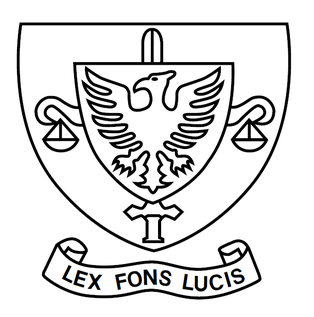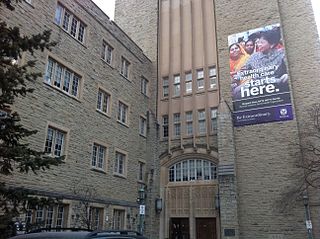
Dalhousie University is a large public research university in Nova Scotia, Canada, with three campuses in Halifax, a fourth in Bible Hill, and a second medical school campus in Saint John, New Brunswick. Dalhousie offers more than 4,000 courses, and over 200 degree programs in 13 undergraduate, graduate, and professional faculties. The university is a member of the U15, a group of research-intensive universities in Canada.

York University, also known as YorkU or simply YU, is a public research university in Toronto, Ontario, Canada. It is Canada's third-largest university, and it has approximately 55,700 students, 7,000 faculty and staff, and over 325,000 alumni worldwide. It has 11 faculties, including the Faculty of Liberal Arts and Professional Studies, Faculty of Science, Lassonde School of Engineering, Schulich School of Business, Osgoode Hall Law School, Glendon College, Faculty of Education, Faculty of Health, Faculty of Environmental and Urban Change, Faculty of Graduate Studies, School of the Arts, Media, Performance and Design, and 28 research centres.

The University of Calgary is a public research university located in Calgary, Alberta, Canada. The University of Calgary started in 1944 as the Calgary branch of the University of Alberta, founded in 1908, prior to being instituted into a separate, autonomous university in 1966. It is composed of 14 faculties and over 85 research institutes and centres. The main campus is located in the northwest quadrant of the city near the Bow River and a smaller south campus is located in the city centre. The main campus houses most of the research facilities and works with provincial and federal research and regulatory agencies, several of which are housed next to the campus such as the Geological Survey of Canada. The main campus covers approximately 200 hectares.

The Schulich School of Law is the law school of Dalhousie University in Halifax, Nova Scotia, Canada. Founded in 1883 as Dalhousie Law School, it is the oldest university-based common law school in Canada. It adopted its current name in October 2009 after receiving a $20-million endowment from Canadian businessman and philanthropist Seymour Schulich.

The Peter A. Allard School of Law is the law school of the University of British Columbia. The faculty offers the Juris Doctor (J.D.) degree. The faculty features courses on business law, tax law, environmental and natural resource law, indigenous law, Pacific Rim issues, and feminist legal theory.

The Schulich School of Business is the business school of York University located in Toronto, Ontario, Canada. The institution provides undergraduate and graduate degree and diploma programs in business administration, finance, accounting, business analytics, public administration and international business as well as a number of PhD and executive programs. Originally known as the Faculty of Administrative Studies (FAS), it was renamed in 1995 after Seymour Schulich, a major benefactor who has donated $15 million to the school. The Dean of the School, Detlev Zwick, was appointed in 2021 after having served as Interim Dean for 15 months.

The University of Virginia School of Law is the law school of the University of Virginia, a public research university in Charlottesville, Virginia. It was founded in 1819 by Thomas Jefferson as part of his "academical village" – which became the University of Virginia – where law was one of the original disciplines taught. UVA Law is the fourth-oldest active law school in the United States and the second-oldest continuously operating law school. The law school offers the J.D., LL.M., and S.J.D. degrees in law and hosts visiting scholars, visiting researchers and a number of legal research centers.

Turnitin is an Internet-based plagiarism detection service run by the American company Turnitin, LLC, a subsidiary of Advance Publications.
Seymour Schulich, OC is a Canadian businessman, investor, author, and philanthropist.

The Schulich School of Medicine & Dentistry is the combined medical school and dental school of the University of Western Ontario, one of 17 medical schools in Canada and one of six in Ontario.
The University of CalgaryFaculty of Law, at the University of Calgary. is a law school in Calgary, Alberta.

The Thomas R. Kline School of Law of Duquesne University is a private Catholic university law school located in Pittsburgh, Pennsylvania. It is approved by the American Bar Association and is a member of the Association of American Law Schools. Dean April M. Barton joined the school in 2019 as its 13th dean.
Bernard Hibbitts is a Canadian lawyer, law professor, academic entrepreneur, editor and publisher currently teaching in the United States at the University of Pittsburgh School of Law. Trained as a legal historian, his early work focused on the historical relationship between law, technology and the senses. In the mid-1990s he wrote a series of controversial articles on the future of law reviews and scholarly publishing in the then-just-emerging age of the Internet. He is best known today as the founder, publisher & Editor-in-Chief of JURIST, the Webby award-winning online legal news service he created in 1996 that is now powered by a volunteer team of over 80 students from 29 law schools in the US, the UK, continental Europe, Kenya, Mauritius, Australia and New Zealand. He is Chairman of the Board of Directors of JURIST Legal News and Research Services, Inc., the 501(c)(3) non-profit corporation he organized to operate JURIST in 2008.
A law review or law journal is a scholarly journal or publication that focuses on legal issues. A law review is a type of legal periodical. Law reviews are a source of research, imbedded with analyzed and referenced legal topics; they also provide a scholarly analysis of emerging law concepts from various topics. Law reviews are generated in almost all law bodies/institutions worldwide. However, in recent years, some have claimed that the traditional influence of law reviews is declining.
The Dalhousie Law Journal is a peer-reviewed academic journal of law published by the Schulich School of Law at Dalhousie University in Halifax, Nova Scotia, Canada. The journal was established in 1973 by Dean Ronald St. John Macdonald and covers contemporary legal issues.
The SOAS School of Law is a law school of the University of London. It is based in the Paul Webley wing of the Senate House in Bloomsbury, London, United Kingdom. The SOAS School of Law has an emphasis on the legal systems of Asia, Africa and the Middle East.

Jocelyn Grant Downie is the James S. Palmer Chair in Public Policy and Law at Schulich School of Law. She was the first Dalhousie scholar to be named a Pierre Trudeau Foundation Fellow.
Corrine Sparks is a Canadian judge. She was the first Black Canadian woman to become a judge in Canada, and the first black judge in the province of Nova Scotia. Her decision in the case R v S (RD), which was controversially overturned on appeal, was later upheld by the Supreme Court of Canada in a leading decision on reasonable apprehension of bias.
Richard Francis Devlin is a Canadian law professor at Dalhousie University. In the late 1990s Devlin, alongside fellow professor Wayne MacKay, was accused by fellow Professor Carol Aylward of being one of the parties that denied her a tenured appointment out of his racial prejudice. Aylward sued both of the professors, as well as others, for denying her the appointment on racial grounds. He was thus named in the lawsuit Cowan et al. v. Aylward et al as a party to oppressing Aylward's academic trajectory, which reached the Nova Scotia Supreme Court. Devlin and Carol Aylward, the woman who accused him of racist treatment, were former coauthors on academic publications. In 2019, Dalhousie made a formal apology for the institution's historical involvement with racist values.
Kim Brooks is a university professor and administrator who currently serves as the Dean of the Faculty of Management at Dalhousie University. Previously, she served as the Dean of the university's Schulich School of Law and as the endowed H. Heward Stikeman Chair in Law of Taxation at the McGill University Faculty of Law. On January 1, 2023 Brooks will become the acting Provost and Vice-President Academic of Dalhousie University.











